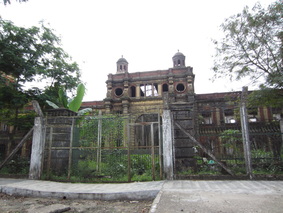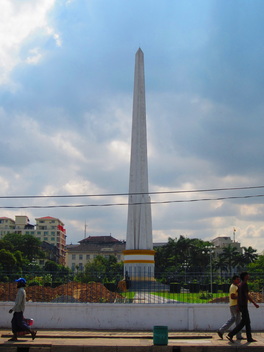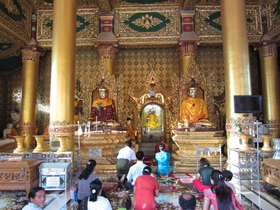
As a background on the country, Myanmar used to be the number one exporter of rice in the world and its textiles were sent across the globe. In the middle of the 20th Century, you would have placed it right alongside its neighbors in terms of development and potentially even assumed it would be one of the most advanced economies in Southeast Asia in the future. However, if you’ve never read anything about Myanmar and have no idea about its current state, I can sum it up in one word: abysmal.
Around 1960, Myanmar was technically a democratic state and could be considered prosperous by the standards of the region. However, with many ethnic groups folded into Myanmar’s borders and a broken “democratic” government, it was near collapse. Regular uprisings and violence from rebel groups triggered Myanmar’s prime minister to ask the military to step in and temporarily oversee the government. A few years later, however, the military staged a full coup d’état and transitioned the country to Socialism (a very corrupt and, to reuse my terminology, “broken” version of it).
This military junta sought self-sufficiency through the country’s abundant natural resources. Everything was controlled by the military, from what crops farmers planted to which industries would receive government focus and funding. With all this power and the output of its people forcibly controlled by the military, the wealth and influence became concentrated in the hands of generals and what are now known as “crony” businessmen. Since 1960, the consolidation of all power, including the control of all industries and international relations, has left Myanmar extremely undeveloped, uneducated, without proper infrastructure, and exceedingly corrupt.
As for what happened that caused Myanmar’s leaders to begin opening the country in 2010 and heading towards democracy, the true motivations may never be known. Some people believe the leaders saw uprisings and overthrown governments in the Middle East as the future of Myanmar. Some people say China’s relentless pursuit of Myanmar’s natural resources and geographical advantage as a shipping thru-point were worrying Myanmar’s leaders as they felt China’s influence and control bearing down on them (Myanmar is known to have economic and military ties to both China and North Korea, and Chinese businesses are notoriously unethical and abusive once embedded in their operations). Others say Myanmar’s “crony” businessmen and wealthy generals believed that by involving the West and having the U.S. remove its sanctions, they could become even richer as they positioned themselves as the partners for new activity from multinational corporations.

So you know, I work in a business unit that is involved in agriculture. It’s estimated that roughly 60-70 percent of Myanmar’s population earns their living through agriculture, so it’s very important to the government and the people. My time in Myanmar involves meeting with government officials and businesses that are involved in this area and looking for partners that can facilitate our operations there.
Leading into Monday afternoon (my first day of meetings), I met with my team for lunch. We then went on to meetings with other companies there. While I can’t provide details, I can tell you that Monday afternoon involved a business meeting and a trip about 1.5 hours away to facilities used for our type of business. The meetings in downtown Yangon were nothing eventful, but the facilities were another story.
As you can imagine, working for a chemical company means being around products and materials that scare most people, even when handled properly. I’d like you to picture what this might feel like in a third-world country, where the facilities are nowhere near the standards of the U.S. I’ve been around chemicals quite a bit now. I’ve watched my technical colleagues run tests. I’ve even been in one of the largest and most integrated chemical manufacturing facilities in the world, but never have I walked into an area or building where I could actually TASTE the chemicals. While we were given white gloves and masks you’d see a surgeon wearing, my mouth, nose, and eyes were filled with what I can only describe as a very sharp sensation. The workers in the facility appeared to be completely unaffected by it. They walked around shirtless, shoeless, and without anything covering their hands, even as they climbed over pallets of products and handled them.
Now to be fair, this is actually exponentially better than what it could be. Another colleague of mine has been to Myanmar on behalf of other business units and visited “warehouses” where these companies store products. I put quotations on the word, because they were actually storing them in converted houses in residential areas. For chemicals, this is completely ill-advised as proper ventilation, drainage, distances from one another and other safety precautions are key to worker health and contamination prevention. Needless to say, my company takes this very seriously and, therefore, has to be extremely careful in how we work in other countries.
Coming back to our day and the facility we were in, it is by no means a reflection on the business people in Myanmar. They are, simply put, some of the nicest people you’ll meet. They just aren’t sophisticated as it pertains to business practices and safety (yet). Their sunny disposition is in direct contrast to their country’s condition, so my company remains hopeful on improvements in the infrastructure there now that the leadership is finally allowing Western companies to come in and help improve Myanmar’s companies. In any case, they welcome companies like mine and openly provide information that should help us better serve them and, in turn, better serve the farmers in Myanmar.
Speaking of farmers, the ride back from the facility was also very interesting for me. We actually had the opportunity to pass directly by some farms as we took a different route to avoid traffic. In the U.S. many farms will have their fair share of older buildings. However, the homes the farmers actually live in look modern enough and have sewer and power running to them. In Myanmar, this is definitely not the case. Farmers’ houses look like makeshift wood and metal shelters with sheets fixed to block rain and wind. There is no running water, no sewer, and no electricity running to them. It’s an incredible sight to see when you’re only about 50 kilometers outside of what is supposed to be a major metropolitan area with electricity, sewer, internet, and many of the modern conveniences we find in the U.S. These farmers, however, don’t get to enjoy these conveniences. Instead, the people that grow the food and provide sustenance for millions of people are left to live in squalor. If you find this ridiculous and unfair, you’re not alone. However, the military junta purposely kept these people oppressed for many years in order to benefit from their work, both in terms of the food that’s eaten and the money that can be made from its trade. Off my soapbox…
This basically ended my first day as the several hours of meetings, travel, and a facility tour took us to the early evening. My team and I had dinner that evening with an individual in a consulate that has been helping us, but the only eventful thing I have to tell you from this is that we ate local rice, and it was EXCELLENT. This is the only rice they really serve in the country and it comes directly from the fields and processing facilities to the dinner table in Myanmar. While this doesn’t mean much to me as I am no expert, my colleagues were extremely excited to be eating what is an award-winning variety of rice (even with Myanmar’s closed government, they’ve participated in international competitions for food and such).
The second day was actually much longer due to our meetings and travel starting early in the morning, but the only real difference from the day before was our visits to shops that sell the types of products we produce. Oddly enough, we saw several of our products there, even though we’re not formally “in” Myanmar just yet. As it turns out, our products have been moving through third parties with our knowledge, but we haven’t formally dedicated ourselves to operating in the country until just recently. That said, I also saw plenty of products at the store that SHOULD NOT have been there. These weren’t ours, but were from companies that I know aren’t supposed to be in the country due to a lack of legal registrations. Myanmar is notorious for its porous land borders with China and Thailand, and medicine, chemicals, electronics, and probably pretty much everything else you can think has entered the country at some point, but maybe not through the proper channels.


 RSS Feed
RSS Feed